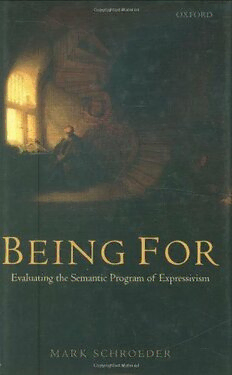Download Being For: Evaluating the Semantic Program of Expressivism PDF Free - Full Version
Download Being For: Evaluating the Semantic Program of Expressivism by Mark Schroeder in PDF format completely FREE. No registration required, no payment needed. Get instant access to this valuable resource on PDFdrive.to!
About Being For: Evaluating the Semantic Program of Expressivism
Expressivism - the sophisticated contemporary incarnation of the noncognitivist research program of Ayer, Stevenson, and Hare - is no longer the province of metaethicists alone. Its comprehensive view about the nature of both normative language and normative thought has also recently been applied to many topics elsewhere in philosophy - including logic, probability, mental and linguistic content, knowledge, epistemic modals, belief, the a priori, and even quantifiers. Yet the semantic commitments of expressivism are still poorly understood and have not been very far developed. As argued within, expressivists have not yet even managed to solve the "negation problem" - to explain why atomic normative sentences are inconsistent with their negations. As a result, it is far from clear that expressivism even could be true, let alone whether it is.Being For seeks to evaluate the semantic commitments of expressivism, by showing how an expressivist semantics would work, what it can do, and what kind of assumptions would be required, in order for it to do it. Building on a highly general understanding of the basic ideas of expressivism, it argues that expressivists can solve the negation problem - but only in one kind of way. It shows how this insight paves the way for an explanatorily powerful, constructive expressivist semantics, which solves many of what have been taken to be the deepest problems for expressivism. But it also argues that no account with these advantages can be generalized to deal with constructions like tense, modals, or binary quantifiers. Expressivism, the book argues, is coherent and interesting, but false.
Detailed Information
| Author: | Mark Schroeder |
|---|---|
| Publication Year: | 2008 |
| ISBN: | 9780191560026 |
| Pages: | 214 |
| Language: | English |
| File Size: | 0.649 |
| Format: | |
| Price: | FREE |
Safe & Secure Download - No registration required
Why Choose PDFdrive for Your Free Being For: Evaluating the Semantic Program of Expressivism Download?
- 100% Free: No hidden fees or subscriptions required for one book every day.
- No Registration: Immediate access is available without creating accounts for one book every day.
- Safe and Secure: Clean downloads without malware or viruses
- Multiple Formats: PDF, MOBI, Mpub,... optimized for all devices
- Educational Resource: Supporting knowledge sharing and learning
Frequently Asked Questions
Is it really free to download Being For: Evaluating the Semantic Program of Expressivism PDF?
Yes, on https://PDFdrive.to you can download Being For: Evaluating the Semantic Program of Expressivism by Mark Schroeder completely free. We don't require any payment, subscription, or registration to access this PDF file. For 3 books every day.
How can I read Being For: Evaluating the Semantic Program of Expressivism on my mobile device?
After downloading Being For: Evaluating the Semantic Program of Expressivism PDF, you can open it with any PDF reader app on your phone or tablet. We recommend using Adobe Acrobat Reader, Apple Books, or Google Play Books for the best reading experience.
Is this the full version of Being For: Evaluating the Semantic Program of Expressivism?
Yes, this is the complete PDF version of Being For: Evaluating the Semantic Program of Expressivism by Mark Schroeder. You will be able to read the entire content as in the printed version without missing any pages.
Is it legal to download Being For: Evaluating the Semantic Program of Expressivism PDF for free?
https://PDFdrive.to provides links to free educational resources available online. We do not store any files on our servers. Please be aware of copyright laws in your country before downloading.
The materials shared are intended for research, educational, and personal use in accordance with fair use principles.

